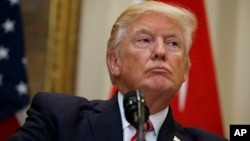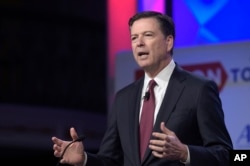The New York Times reported Tuesday that President Donald Trump asked former FBI director James Comey to “let go” of the investigation into former National Security Adviser Mike Flynn, and since then, opposition lawmakers have been lining up to accuse Trump of obstructing justice.
Adding to their dismay, Trump fired Comey last week, citing the Russia investigation as his primary motivation.
“When I decided to just do it, I said to myself, I said, ‘You know, this Russia thing with Trump and Russia is a made-up story,’” Trump said in an interview with NBC. “It's an excuse by the Democrats for having lost an election that they should have won.”
The Russia investigation is technically separate from the investigation into Flynn, although the two are related.
Another Times report last week cited anonymous sources who claimed Trump asked Comey to pledge his loyalty to the president during a one-on-one dinner in January, shortly after Trump was inaugurated. Comey declined, according to the sources.
The day after that Times report was published, Trump seemingly threatened Comey on Twitter, saying Comey “better hope that there are no ‘tapes’ of our conversations before he starts leaking to the press."
Trump has denied any wrongdoing in his firing of Comey, and on Tuesday the White House denied Trump asked Comey to end the investigation.
“The president has never asked Mr. Comey or anyone else to end any investigation, including any investigation involving General Flynn,” the White House said in a statement.
Despite the White House denials, some opposition lawmakers are questioning whether Trump's actions amount to obstruction of justice, and even calling for his removal from office.
On CNN Tuesday night, Sen. Angus King said Trump's actions, if true, run “very close to the legal definition of obstruction of justice,” and said Trump could potentially face impeachment proceedings.
Rep. Al Green on Wednesday called for Trump's impeachment on the House floor over allegations of obstruction of justice. He said it wasn't for political purposes, but rather because he believes in “the great ideals this country stands for.”
Here's a brief legal explainer in a question-and-answer format about what constitutes obstruction of justice, and the potential consequences Trump could face.
What is obstruction of justice?
Obstruction of justice is a federal crime covering interference with official government proceedings. It is defined broadly as the attempt to "influence, obstruct, or impede, the due administration of justice" in a corrupt or threatening manner.
Is Trump guilty of obstruction?
It's unclear. First, it would need to be established that Trump acted in a corrupt manner, and as Andrew McCarthy, a former federal prosecutor, wrote in conservative publication National Review, that is extremely difficult to do.
“I do think obstruction of justice, to anyone who has had to prove it in court, is not easy. It has a lot to do with intent, with the context in which things are said and perhaps, the most important word in the statute: ‘corruptly,’” he wrote.
According to McCarthy, nothing reported so far would, in itself, constitute obstruction of justice.
“A prosecutor wouldn't make a decision on the basis of one hearsay line in a memo that has not been publicly available and that no one knows the context of,” he wrote.
But as Ryan Goodman, a law professor at New York University, pointed out in Politico: If taken together, Trump's alleged comments to Comey regarding his allegiance and Trump's alleged request that Comey drop the Flynn investigation, prior to Trump's dismissal of Comey, could help establish intent.
“Was the president's expressing his ‘hope’ an exercise of coercion or pressure? It definitely was if it involved an implicit threat that Comey's job was on the line. The events before and after that meeting suggest that's exactly what it was about,” Goodman wrote.
“Those subsequent actions help prove that yes, indeed, the president was threatening the FBI director with his job that day.”
Could Trump be indicted?
Unlikely. An opinion written by the Department of Justice's Office of Legal Council in 2000 concluded that a sitting president is immune from indictment or federal prosecution.
According to the memo, written by then-assistant Attorney General Randolph D. Moss, “a sitting President is immune from indictment as well as from further criminal process,” noting that only Congress has the authority to bring charges of criminal misconduct against a president through the impeachment process.
Could Trump be impeached?
Yes. Obstruction of justice accusations were used to bring impeachment proceedings against both Bill Clinton in 1998, and Richard Nixon in 1974.
Whether Trump could be impeached over his alleged wrongdoing will come down to a political decision in Congress. Goodman says that is where things start to get murky.
“Congress may define impeachable offenses more broadly than anything that's in the federal criminal code and members must satisfy only their own consciences' with respect to the president's guilt rather than any hard standard of proof.”
In essence, the standard for impeachment boils down to whether a majority of the House and two-thirds of the Senate think Trump's actions should see him removed from power.
There is no real legal hurdle to pass during impeachment proceedings, but given the current Republican majorities in both houses of Congress, Goodman called a Trump impeachment a “most unlikely prospect.”







